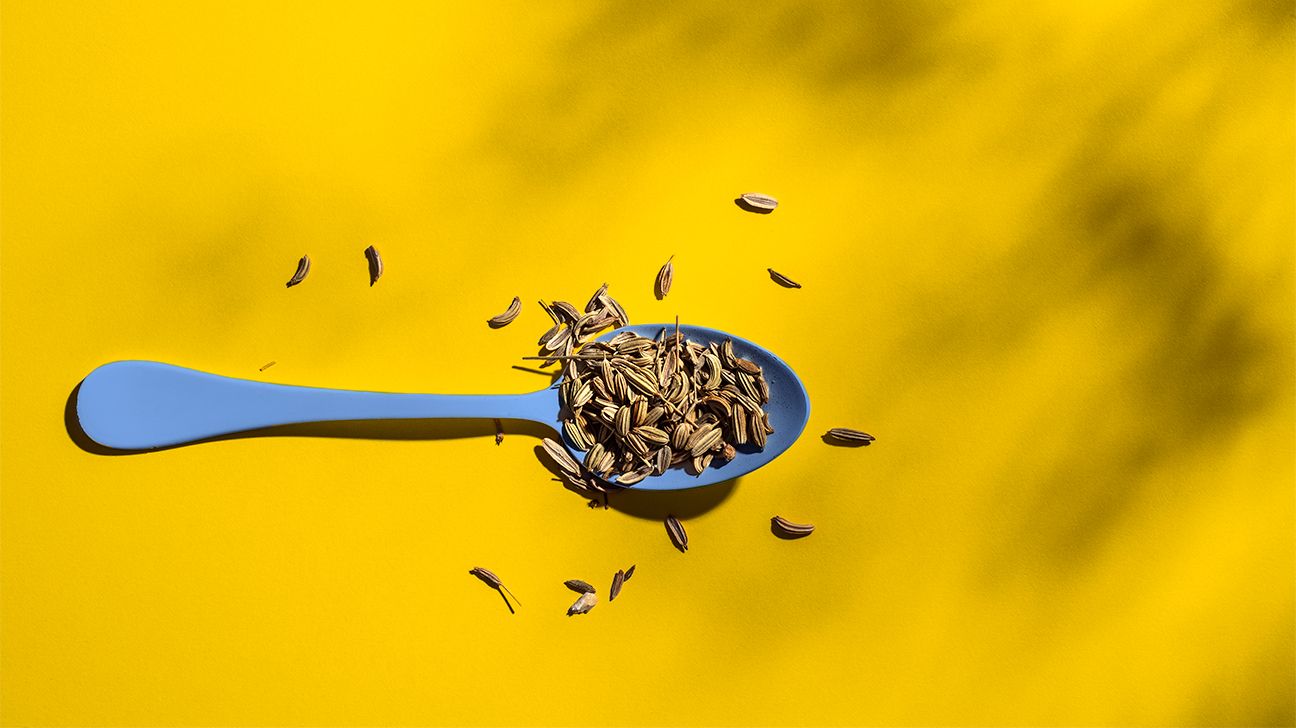Fennel is a beloved veggie that’s a bit like a cross between celery and licorice (there’s a reason it’s an ingredient in absinthe!).
It’s got a mild anise-y taste, which is what gives licorice its unique flavor. And the whole plant, from the root to the flowers, can be used in cooking. The seeds are commonly dried to use as a spice or to make fennel tea, a classic stomach-settling herbal tea.
Fennel tea is a favorite after-dinner drink because it can help promote healthy digestion and keep things moving. It may also have some other benefits, like making it easier to lose weight and improving breast milk production.
Here are several reasons you should finally (fennel-y?) try fennel tea.

Breastfeeding
Fennel tea might be a beneficial addition for nursing parents and hungry babies. It contains a phytoestrogen called anethole, which could help boost breast milk production and result in increased weight gain for infants.
Weight loss
A small 2015 study found that women who drank fennel tea before a meal reported less hunger, ate less food, and felt fuller than women who drank a placebo tea before eating.
Although this study wasn’t looking at long-term effects of fennel tea on weight, appetite management and feeling full are huge parts of successfully losing weight and keeping it off.
So, sipping on fennel tea may be a great way to keep hunger at bay.
Digestion
Fennel tea is regularly (pun intended) used to help with digestion. It’s a key ingredient in the popular and aptly-named Smooth Move tea, which is formulated to relieve constipation (and really works).
There’s also some evidence that fennel tea on its own can make it a bit easier to go number two, especially in situations where it may be tough (like after surgery). It’s the brew that helps you poo!
Crying kiddos
Finally, fennel tea may help to calm fussy babies who have a condition called colic, which is characterized by crying that doesn’t. Ever. Stop. Sounds lovely, right?
The exact cause of colic isn’t known, but it may be due to tiny tummy troubles, which the active compounds in fennel could help remedy.
But (and this is a giant but) talk to your baby’s pediatrician before you start adding fennel tea to their bottles. Babies have notoriously sensitive stomachs that — in the early months, at least — are really only equipped to handle breast milk or formula.
You can buy fennel tea online or in stores in the form of tea bags, loose tea, or powder. Since dried fennel seeds are a fairly common spice, you can also raid the far reaches of your spice cabinet to see if you have some lying around.
Here’s how to make it:
From a tea bag
Pour boiling water over the tea bag in a mug and let it steep for about 5 minutes (or longer, if you prefer a stronger-tasting tea).
From dried fennel seeds or loose tea
Loose fennel tea should be good to go. But if you’re using fennel seeds, you’ll need to crush them before making tea so that the good stuff inside the seeds can steep into the water. You can do this with a mortar and pestle or a coffee grinder (on the “coarse” setting).
Load up a tea infuser with about 1 tablespoon of crushed fennel seeds or loose tea and steep it in boiling water for about 5 minutes.
From powdered fennel
Mix 1 to 2 teaspoons of powdered fennel into a cup of hot or cold water. Easy-peasy.
Once your tea is ready, you can add some sweetener if needed. We recommend honey or stevia. A squeeze of lemon or some grated ginger may also help improve the taste while providing some extra health benefits.
Fennel is generally recognized as safe by the FDA and has been found to be well-tolerated in adults.
But some research suggests that because fennel contains phytoestrogens, it may affect hormone levels (especially in kids) when used frequently or in high doses.
Sipping on a cup after dinner when you need some *ahem* digestive assistance, though? Totally fine.
And because it bears repeating: Always talk to a pediatrician before giving fennel tea to your baby.
- Fennel tea is made from dried fennel seeds, which have a mild licorice flavor.
- Sipping on fennel tea may help boost breast milk production, suppress appetite, and relieve constipation.
- You can make it from tea bags, loose tea, dried fennel seeds, or powdered fennel. Just make sure to crush or grind whole fennel seeds before making your tea.
- Fennel is generally considered safe, but high doses may affect hormone levels, especially in kids.
- Third time’s the charm: Loop a pediatrician into the convo before giving fennel tea to your baby.

